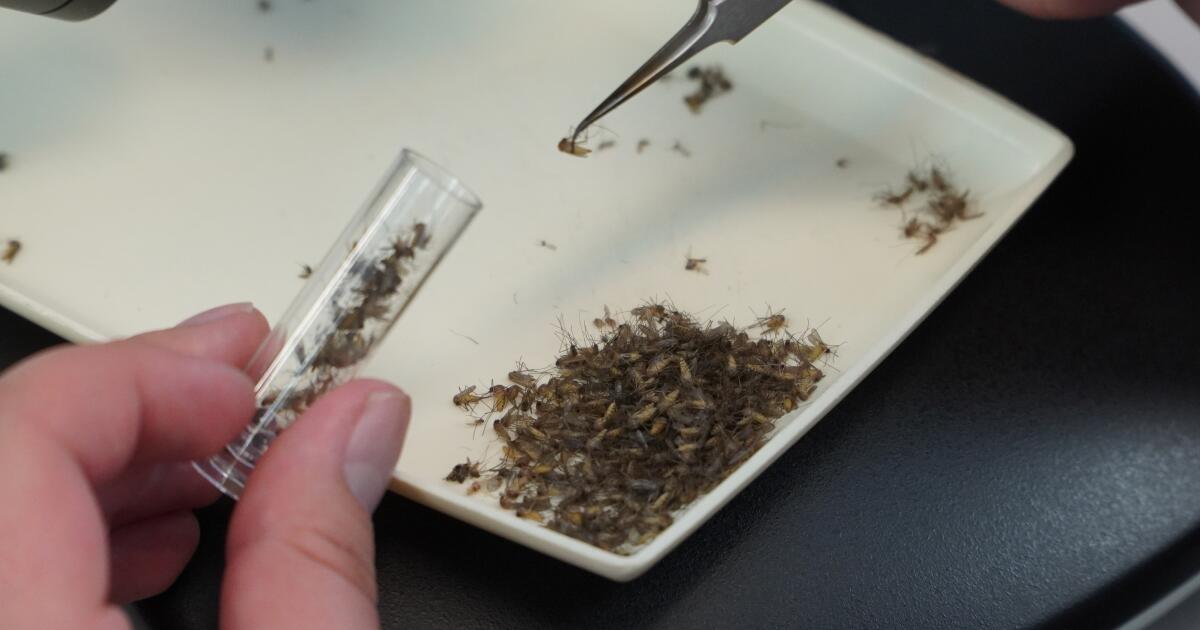Another county in Southern California has confirmed finding mosquitoes that carry the West Nile virus.
They were the first mosquito samples to test positive for the virus this year in Orange County, but according to the state Department of Public Health, 20 of California’s 58 counties have experienced West Nile virus activity in 2024.
Orange County has been “pretty lucky this year,” said Brian Brannon of the county’s Mosquito and Vector Control District. Current heat wave aside, he noted locally cooler temperatures, particularly in the evenings, have meant “we haven’t seen a lot of mosquitoes.”
According to the agency, the infectious insects were found in Huntington Beach during routine testing in the region. West Nile — which can cause symptoms including headache and fever and, in rare cases, may prove fatal — is exclusively spread in Southern California by bloodsucking Culex mosquitoes that feast at dawn and dusk.
Brannon said there was no reason for panic. The threat to the public is still low in Orange and Los Angeles counties, where no West Nile-related bird deaths have been reported. Birds are susceptible to contracting the virus, and such deaths would be a clear signal the disease is spreading.
The state public health department counted 88 dead birds as positive for the virus so far this year. Santa Clara and Sacramento counties accounted for most of the birds. Notably, there have been no human cases in California thus far in 2024.
Residents averse to getting bitten can reduce their risk by removing stagnant containers of water from around their homes — such as uncovered outdoor grills and potted plants with saucers — where mosquitoes breed. Also, opt for long-sleeved clothing and apply a repellent that contains DEET, oil of lemon eucalyptus or another effective active ingredient.
Other agencies across Southern California are on the lookout too, monitoring types of mosquitoes and their population numbers, Brannon said.
In recent years, the invasive Aedes aegypti has aggressively grown in numbers. These bloodsuckers need only a teaspoon of water to reproduce and, unlike the Culex, have an affinity for biting at all hours of the day. They can also spread diseases such as yellow fever, dengue and Zika.
“So far this season, we’ve only seen the West Nile,” Brannon said, “but we are on the lookout for any other potential disease that can be spread.”
The Greater Los Angeles County Vector Control District has found three cases of the West Nile virus in mosquito samples from the San Fernando Valley, and officials are on the lookout for more as this year’s heavy rainfall made conditions ripe for a mosquito takeover.
“Currently we’re still in normal season. We have not entered any high risk level,” said Susanne Kluh, the general manager at the L.A. County agency. She said it’s normal for these humidity- and heat-loving mosquitoes to be more active in the Valley.
“The virus amplifies more quickly at higher temperatures,” Kluh said, noting that climate change has been a boon for subtropical mosquitoes and the diseases they carry. Mosquitoes have the capability to adapt to “drier or cooler climates,” she added, where “they will keep distributing.”
In spring, vector control agencies across Southern California attempted a new and innovative way to stop the spread of Aedes mosquitoes — by releasing more of them. The strategy, as counterintuitive as it sounds, is exciting, said Tristan Alexander Hallum, director of scientific programs at the San Gabriel Valley Mosquito and Vector Control District.
“We’re starting to develop different techniques of sterilization to be able to curb those populations,” Hallum said. Although it’s too early to have data on the efficacy of these efforts, the idea is that sterilizing male mosquitoes with radiation will start to reduce the number of viable eggs. “Radiation has been a tried and tested method for different programs like the screwworm fly.”
This summer, Hallum said, the fear of catching West Nile or other illnesses from mosquitoes shouldn’t prevent anyone from taking part in recreational activities outdoors.
“I would never be afraid of mosquito-borne pathogens that we see on a consistent basis,” Hallum said. “We’re very much at a routine level of West Nile virus currently within our area.”
